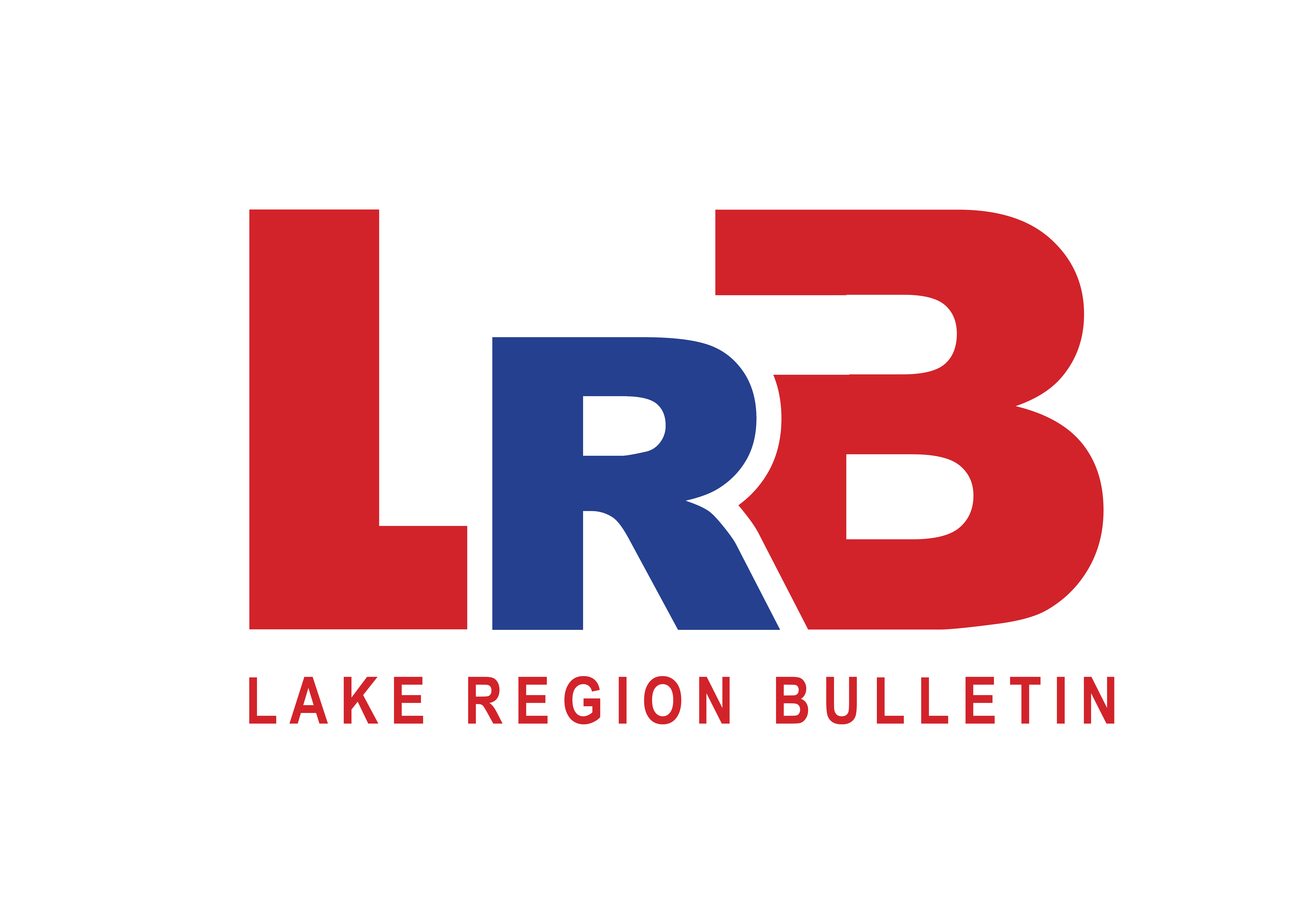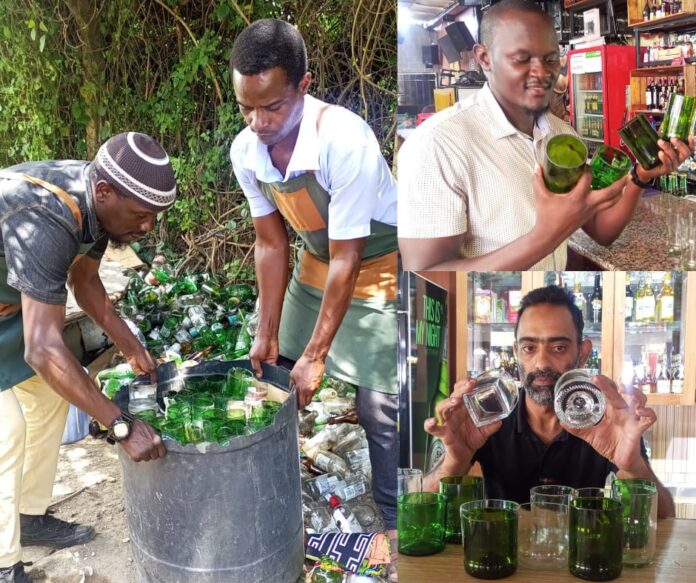It was about a decade ago at Dunga Hill Camp, a popular restaurant at the shores of Lake Victoria, in Kisumu where it all started.
The management of the facility was worried as profits were dwindling, and one of the major reasons was breakage of glasses.
The management had to act.
Glasses cost between Sh100 and Sh300, and we could lose upto 500 bottles to breakage and theft every month
Audrey Okoth, a manager at Dunga Hill Camp
Maxwel Riala was, out of passion, cutting bottles into various shapes and designs for aesthetic purposes.
“The proprietor of the facility approached me, and explained to me that he had witnessed some people cutting glass bottles and reusing them,” said Riala.
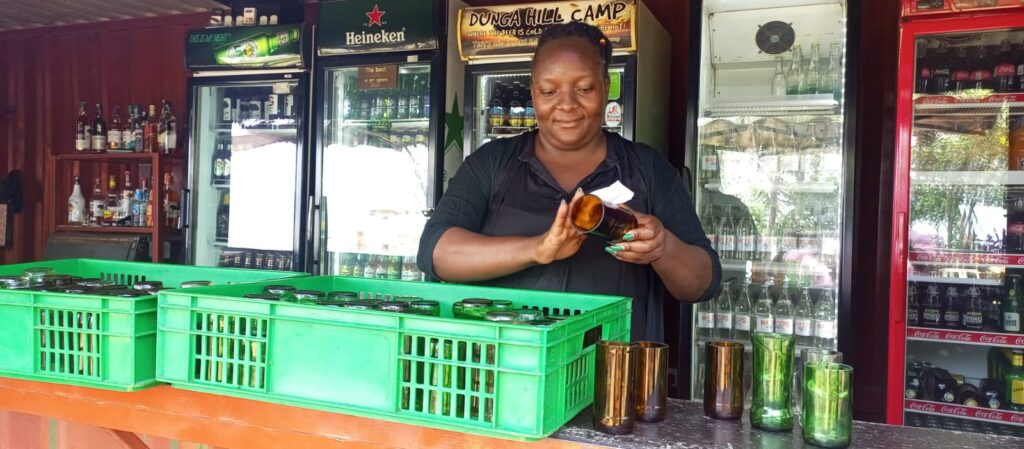
Saving the environment
After numerous trials, Riala was able to master the art, and began collecting used alcohol bottles and cutting them, and using them as drinking glasses.
To the restaurant, this was a cost-cutting measure to reduce expenses on glasses.
“Glasses cost between Sh100 and Sh300, and we could lose upto 500 bottles to breakage and theft every month,” said Audrey Okoth, a manager at the facility.
And with the innovation, they realised huge reduction of waste bottles for disposal.
“We discovered we were greatly solving the problem of waste bottles as there was very little or none to dispose,” added Ms Okoth.
She noted: “We fully embraced this and begun capacity building our staffs who would later engage the patrons who quickly embraced the bottle glasses.”
At first, Ms Okoth said, some people rejected the bottle glasses, but slowly understood the concept of environmental conservation, and some would seek for referrals to buy the glasses for their home use.
Riala perfected his art, and with time he saw this as an opportunity to create an enterprise.
The management of the facility would collect used disposable bottles every day, and Riala would collect them every week for processing.
The facility would then buy the processed bottles from him, hence creating a job opportunity for him, and brought in his wife to help.
Today, Mr Riala has partnered with environmental activist Dave Ojuondo, and the duo have escalated the initiative to other liquor retailers in Kisumu.
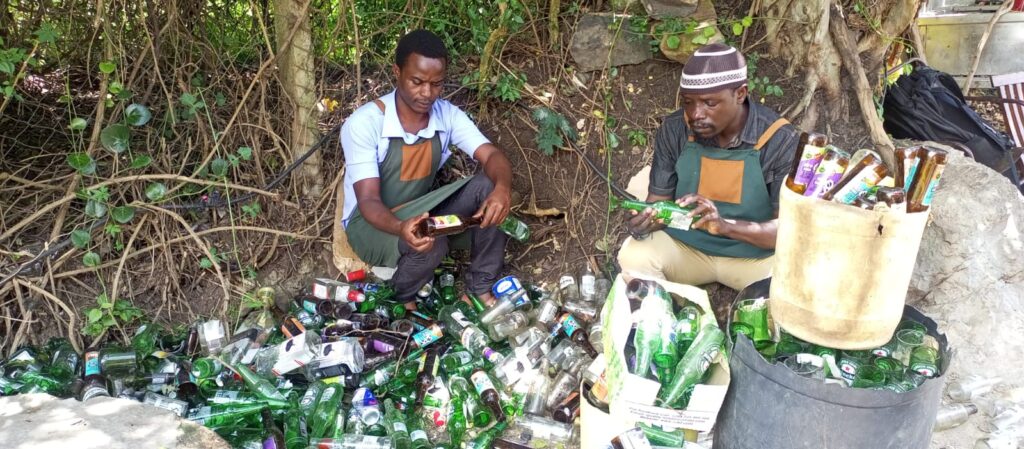
Embracing waste bottle glasses saving costs
When Lake Region Bulletin visited Allyways Club within Kisumu Central Business District, the facility Supervisor James Oyoo was taking stock of the inventory.
Part of this exercise involve checking on the glasses, furniture, in addition to checking on stocks.
Today, 50 per cent of the glasses we use are from the bottles. We have been engaging our customers, and many of them now see the environmental aspects of it, and embrace it
James Oyoo
Allyways is one of the facilities which has embraced glasses processed from used bottles.
“Today, 50 per cent of the glasses we use are from the bottles. We have been engaging our customers, and many of them now see the environmental aspects of it, and embrace it,” said Oyoo.
Just like Dunga Hill Camp, Oyoo says his staff collects used liquour bottles, and Riala picks them every two to three weeks for processing.
The facility then buys the processed glasses from Riala.
“This intervention has greatly reduced our expense on buying glasses. On top of this, we can see how much we are saving the environment, as we previously produced about 1000 bottles per month, and a good number of them would find its way into the environment,” said Oyoo.
Turning threats into opportunities
The situation is not different at Club Samba, about 500 metres away.
Club Manager Gurdeep Singh says he embraced the idea of using the bottles in early 2023, and he spends between Sh30 to Sh50 on the bottles, as opposed to the normal glasses which cost at least Sh100.
“I tell you these bottle glasses are very strong and rarely break. And even if one or two breaks, I do not surcharge my customers because the loss is very minimal as opposed to the expensive normal glasses,” said Singh, adding that disposal too had its share of expense.
“Remember, most of the liquour bottles are disposable, as opposed to soda bottles which are returned to the factory. So previously we would crash the disposable liquor bottles and bury them, or take them to construction sites where they used them in constructing perimeter walls among other uses,” Sing added.
Our mission is turning threats into opportunities. The environment is facing a lot of threats, and recycling the bottles is one of the perfect illustration of this initiative
Dave Ojuondo
Mr Ojuondo has been implementing an environmental conservation strategy across Lake Victoria Basin through Justice for Lake Victoria and Naam Festival.
“Our mission is turning threats into opportunities. The environment is facing a lot of threats, and recycling the bottles is one of the perfect illustration of this initiative,” said Ojuondo.
Ojuondo and Riala have since established a waste collection centre at Dunga Hill Camp, where they process them for sale.
The duo regularly visit on-boarded restaurants and liqour joints where they collect the disposable bottles, and take them to the centre.
The bottles are then checked to ensure they do not have cracks, before being sorted.
A special bottle cutter is then used to measure and make marks at the desirable sizes. The mark is then passed through candle flame to soften it, before it is broken off.
The edges of the resulting glasses are then scrubbed to make them smooth, before being soaked to allow removal of any stickers.
They are then disinfected, washed and dried before being packed awaiting delivery to clients.
“We sell the bottles at between Sh30 and Sh50. This is because we get the waste bottles from the same clients we sell the glasses to,” said Riala.
The centre also recycles fabric wastes, as well as hosting engagements on environmental conservation, with special focus on Lake Victoria.
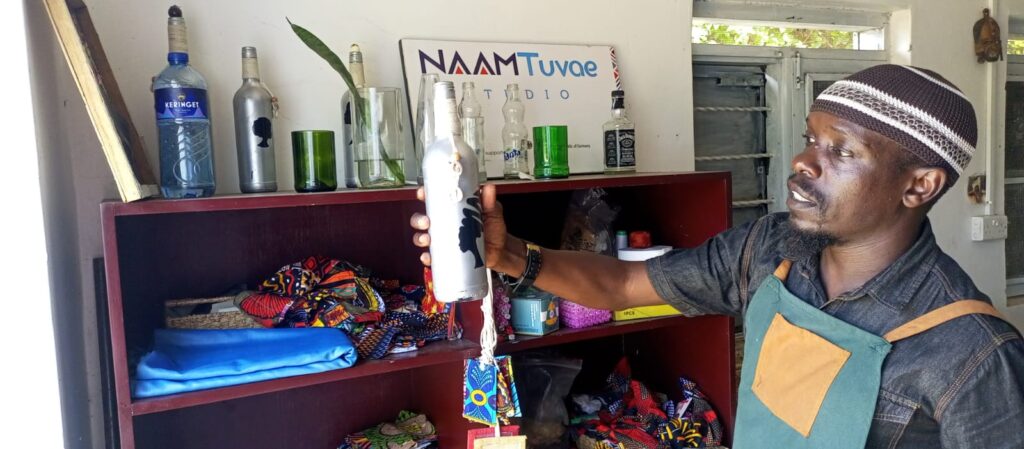
During the process of producing this story, Lake region Bulletin team attended one of such engagements, named Communication Activism Campaign, an initiative under Infonile’s Environmental Youth Activism Program.
“This is a forum which brings together stakeholders such as environmentalists, the community, policy makers, and students,” he said.
According tor Christopher Aura, the Director of Fresh Water Systems Research at the Kenya Marine and Fisheries Research Institute (KMFRI), water has some form of heating.
When glass is disposed in water, the heating melts glass, releasing Sulphur Oxide and Nitrogen Oxide which are major green house gases.
Part of these gases get dissolved in water while others escape into the air causing green house effects.
“People think glass is clean and has no impact to the environment, but this is not true. The best way to deal with glass waste is recycling,” said Dr Aura who is in charge of aquatic research in lakes including; Victoria, Turkana, Naivasha and Baringo.
Dr Aura however noted that not much research has been done on how glass pollution has affected Lake Victoria ecosystem, as much focus has been on plastics due to its large volumes being released into the environment.
Apart from its impacts into the environment, researches have also pointed out that there are much more negative impact to the environment in the process of producing glass.
A study by Environmental experts at the University of Southampton found that while plastic bottles generally cause more environmental impact at the end of their life cycle, glass bottles have a more damaging overall effect, largely because they are heavier and require more energy for their production.
As quoted by Earth.org, Alice Brock, postgraduate researcher and co-author of the study, called for large-scale societal changes aimed at mitigating the ecological impacts of single-use drinks containers.
“Based on the evidence, society needs to move away from single-use beverage packaging in order to reduce environmental harm and embrace the regular everyday use of reusable containers as standard practice” noted Alice as quoted by Eart.org in an article published in 2020, and authored by Alex Coughlan.
